Wednesday night’s meeting of our Number Talks workgroup was focused on addressing two issues raised at our last session– producing a quick reference card for Number Talks that teachers new to the practice could use to help guide discussions, and second, helping teachers understand how to select Number Talks given the range in abilities they see within their classroom.
Quick Reference Card
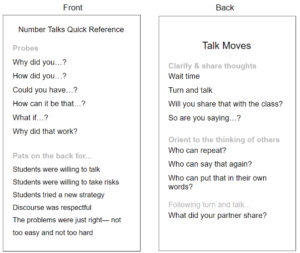 After our October session, we created a draft version of the quick reference card, which coaches from Brown Street Academy and La Causa were able to share with their teachers. From the feedback received from teachers and some ideas that came up in last night’s discussion, we made a couple of revisions and sent it back out for feedback. If all looks good, we’ll work with Milwaukee Succeeds to print and laminate a stack of these we can share with teachers working with Number Talks.
After our October session, we created a draft version of the quick reference card, which coaches from Brown Street Academy and La Causa were able to share with their teachers. From the feedback received from teachers and some ideas that came up in last night’s discussion, we made a couple of revisions and sent it back out for feedback. If all looks good, we’ll work with Milwaukee Succeeds to print and laminate a stack of these we can share with teachers working with Number Talks.
Choosing Number Talks
The First 20 Day plans used by Brown Street and La Causa teachers laid out a set of Number Talks for the start of the semester. This allowed teachers to get comfortable with the routine at the start of the year without having to give a lot of thought as to which problem sets would be most useful for their students. Since one of the goals of Number Talks is to build understanding where students may have missed something, teachers can’t simply choose problems based on the pacing guide for the curriculum, and instead, need to target number talks around the gaps in understanding that students have.
We began our discussion with the hypothesis that if we identified a set of common misunderstandings, we could match those to one or more math strategies that help illuminate the misunderstanding. Since our references for Number Talk problem sets are keyed to the strategies that are useful in solving the problems, that would allow teachers to follow a path from misunderstanding to strategy to problem set.
As we talked through the approach, however, it became clear that mapping this out in a way that accounts for both the misunderstanding and the skills teachers are trying to build (getting away from counting on, for example) would result in a complex index. Further, even if one could produce such an index, if teachers simply followed that by rote, it would not help them build the skills that allow them to recognize where a student is and the best exercises to guide students’ understanding.
At this point, we took a step back. We want teachers to get practice choosing number talks and for them to understand the signs that led to a good choice. We also wanted to ensure that they had the right feedback to develop their skills in charting the thinking of students during Number Talks. Here’s the approach we settled on to test out over the next several weeks.
- The coach will work with grade level teachers to select one or two strategies to focus on for the coming month from Math Strategies guides for addition, subtraction, multiplication, and division produced by MPS as part of a GE Foundation grant.
- For each strategy identified as a focus for the current month, grade level teachers will pull a sets of Number Talk problems from the guides produced by Boston Public Schools which groups Number Talk problem sets by the math strategies they are likely to invoke. Three guides cover first, second, and third-fifth grade. Since the schools we’re working with have kids with a wide range of skills, teachers will focus on problems appropriate for where their students are.
- Grade level teachers will select their own problem sets, but as a team, will select at least a couple that will be used by each of their grade level colleagues
- Teachers will document student thinking on chart paper rather than smart/white boards so they may easily be shared at grade level meetings with the math coach. These meetings will provide a venue to walk through how student’s thinking was charted, which number talks worked well given where students are, and how those observations can help guide the selection of the next round of problem sets.
As we stepped through this approach, we also recognized the need to list a few signs for teachers that Number Talks are going well:
- Students were willing to talk
- Students were willing to take risks
- Students tried a new strategy
- Discourse was respectful
- The problems were just right— not too easy and not too hard
This resulted in the “Pats on the back” section of the quick reference card.
One other big decision came out of the discussion– we shifted the time and venue for our December 12th meeting to join the Milwaukee Area Math Council at City Lights Brewing at 6:00 pm. Join us if you can.
If you’d like to become part of our Number Talks workgroup us, let us know:
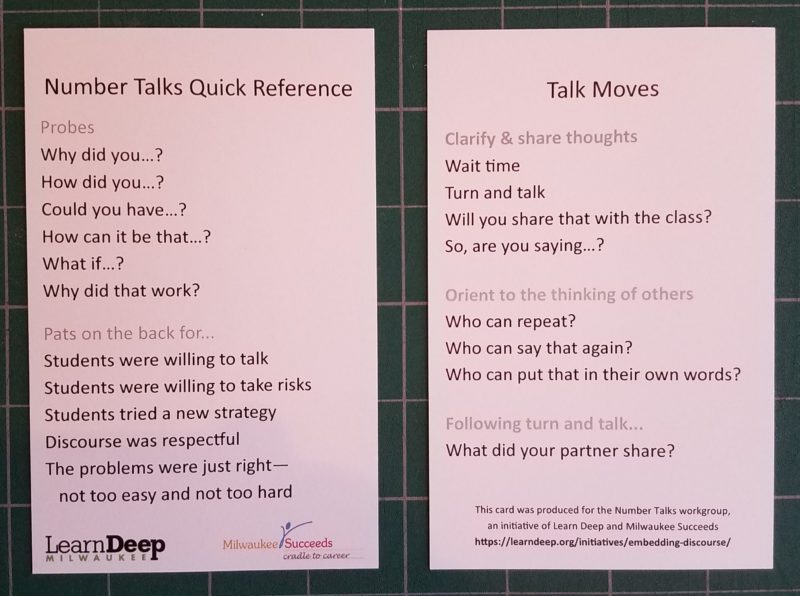 This month we joined the Milwaukee Area Math Council at City Lights Brewery for conversation about math and math education. We were also able to distribute copies of the latest version of our Number Talks quick reference card, which Milwaukee Succeeds had printed for us. We’ll have the final version laminated, but we’re taking advantage of a mix-up when the printer forgot to laminate these.
This month we joined the Milwaukee Area Math Council at City Lights Brewery for conversation about math and math education. We were also able to distribute copies of the latest version of our Number Talks quick reference card, which Milwaukee Succeeds had printed for us. We’ll have the final version laminated, but we’re taking advantage of a mix-up when the printer forgot to laminate these.

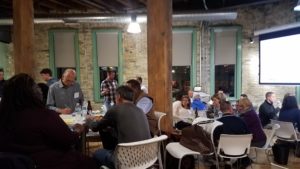 Over the summer we met with Ryan Bennett from SafeNet Consulting and Ryan Osterberg from Brookfield Central to talk about the CS internship program they put together for high school students. That program leads teams of high school students to develop custom applications for other local non-profits. Over the past 2 years, they’ve developed an effective way to engage students in meaningful, high quality work. They have started a new non-profit, Code The Way, to carry on the effort and reach a broader pool of talent.
Over the summer we met with Ryan Bennett from SafeNet Consulting and Ryan Osterberg from Brookfield Central to talk about the CS internship program they put together for high school students. That program leads teams of high school students to develop custom applications for other local non-profits. Over the past 2 years, they’ve developed an effective way to engage students in meaningful, high quality work. They have started a new non-profit, Code The Way, to carry on the effort and reach a broader pool of talent.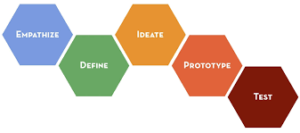
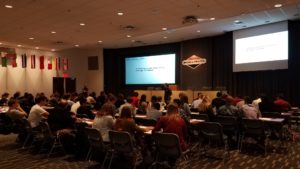 Beyond sparking some initial thinking, the session served as a great chance for teachers leading student teams to connect around how they look to run the project.
Beyond sparking some initial thinking, the session served as a great chance for teachers leading student teams to connect around how they look to run the project.